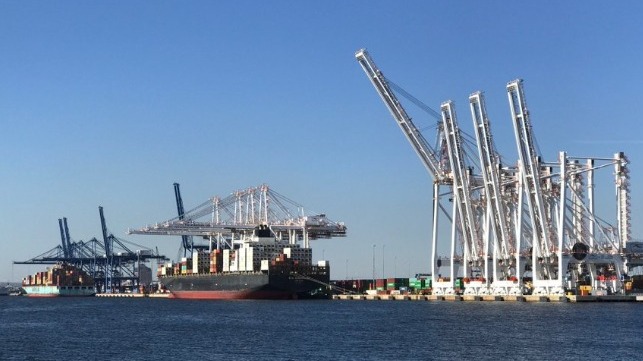As Major U.S. Hub Ports Struggle, Their Neighbors Want More Traffic

The hub ports of Los Angeles, Long Beach and Savannah may be visibly struggling under the weight of hundreds of thousands of imported containers, but that can't be said of all their neighbors. As dozens of ships stack up at anchor at America's busiest destinations for import cargo, other capable facilities are running under capacity and are calling for more traffic.
At the Port of Oakland, some 300 nm to the north of LA/Long Beach, officials say that there have been no backlogs at all since August. But lines have continued to skip calls, and container volume actually fell by 13 percent in September - leaving plenty of room at the pier.
“There’s no congestion at the Oakland seaport, and we’re ready for more business,” Port of Oakland Maritime Director Bryan Brandes said in a statement. “We need ocean carriers to reinstate services in order to stabilize the supply chain, and our import and export partners echo this sentiment.”
The port struggled over the summer with a longshore labor shortage and a crane construction project, and carriers responded by skipping calls. Those problems have now been resolved, the port said, but the vessel services have not yet returned.
John Lee, the president of an Oakland-based forwarding company, suggested that there may be a strong financial incentive for carriers to omit Oakland. LA/Long Beach is too important to skip, so the wait time at anchor is baked in; once a ship finally makes it to the pier in LA/Long Beach, it makes fiscal sense to head right back to Asia, skipping Oakland but keeping the ship on schedule. (This also speeds up the return of empty containers to Asia, where boxes are in high demand for lucrative head-haul cargoes.)
“We should see vessel calls and cargo volume recover in October and November,” said port director Bryan Brandes. “We have capacity in Oakland that needs to be put to use to help shore up the supply chain and support our economy.”
At the Port of Baltimore, officials say that they are seeing more traffic because of congestion at other East Coast hubs. Over the past year, the port's container terminals have handled roughly two dozen unscheduled port calls for vessels that needed an alternate port.

that matters most
Get the latest maritime news delivered to your inbox daily.
In addition, Baltimore has recently secured two additional vessel services totaling 21 ships. It is preparing for the extra traffic with four new Neopanamax container cranes, which will give it enough capacity to work two ultra-large boxships at the same time.
“We are expanding and helping with the supply chain by attracting new services and container ships into the port of Baltimore so we can help alleviate the strain," said Maryland Port Administration Executive Director William Doyle.
